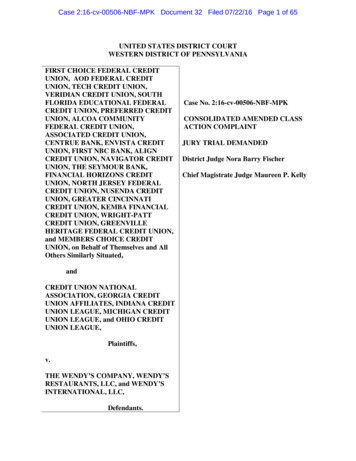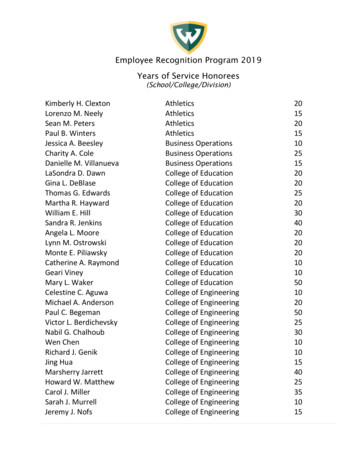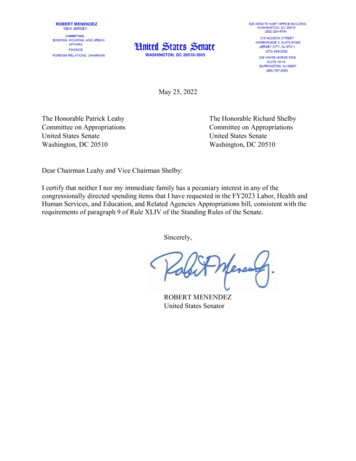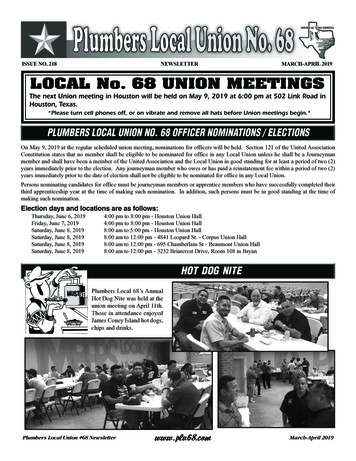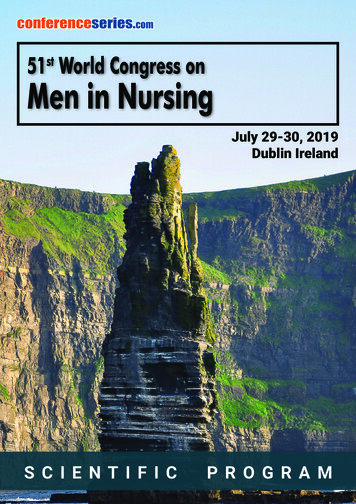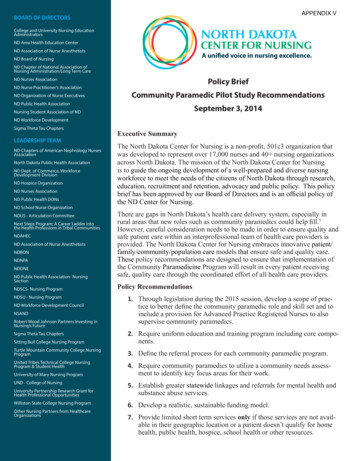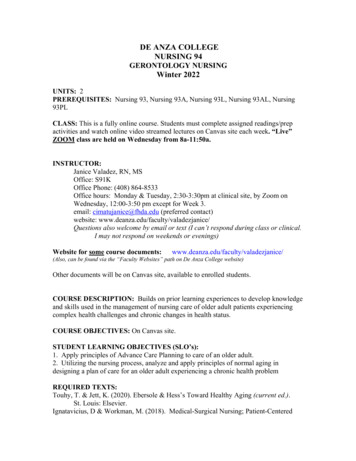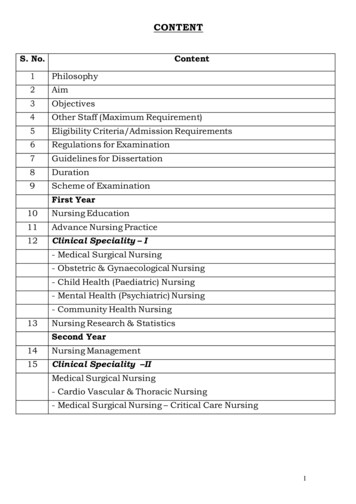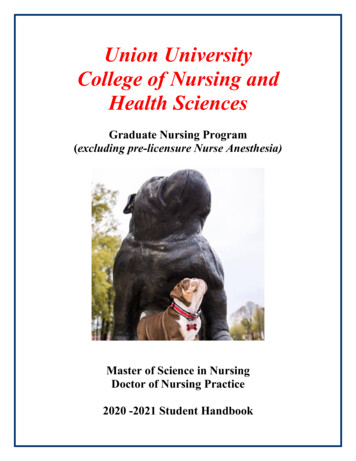
Transcription
Union UniversityCollege of Nursing andHealth SciencesGraduate Nursing Program(excluding pre-licensure Nurse Anesthesia)Master of Science in NursingDoctor of Nursing Practice2020 -2021 Student Handbook
Graduate Nursing Handbook 2020-2021Table of ContentsDean’s Message .3Introduction .4Guiding Statements .6Code of Ethics .13Faculty and Staff Information .15Campus Information .17MSN Mission Statement, Program Outcomes, Program Description.19MSN Nurse Education Track Curricula .20MSN Nurse Administration Track Curricula .23MSN Nurse Practitioner Track Curricula .26DNP Mission Statement, Program Outcomes, and Program Description .30DNP Curricula .31Graduate Course Descriptions .40Orientation and Policy Information .50Policies Regarding Scholarly Project and Thesis for MSN Degree .54Policies Regarding Scholarly Project for DNP Degree .63College of Nursing and Health Sciences Sponsored Organizations .64Library Databases .65Computer Requirements .67ADA and Language Proficiency .67Signature Page .69Privacy Act .702
Graduate Nursing Handbook 2020-20213Welcome to the Graduate Nursing Program at Union University! I applaud your decision toadvance your nursing education and trust that it will be an exciting as well as challengingexperience. Our graduate nursing faculty are dedicated, caring professional nursing educatorswho have a steadfast commitment to preparing nursing leaders who will address the manyopportunities facing nursing and health care today. Union University is guided by principles thatensure a learning environment that is excellence driven, Christ-centered, people focused andfuture directed. The goal of graduate faculty in the College of Nursing and Health Sciencesis to prepare nursing leaders who have advanced knowledge and skills in health care and areempowered to address the many ethical and bioethical dilemmas present in contemporarysociety. I wish you success in this academic endeavor and pray that you will develop meaningfulpersonal and professional friendships that will be supportive to you for years to come.Sincerely,Kelly Harden DNSc, APRN, FNP-BC, FAANPDean and ProfessorCollege of Nursing and Health Sciences
Graduate Nursing Handbook 2020-20214INTRODUCTIONUnion University is a private, four-year liberal arts university, founded in 1823, and affiliatedwith the Tennessee Baptist Convention. As an institution that is Baptist by tradition andevangelical by conviction, Union has a heritage of academic excellence and is well known forproviding qualitatively distinctive Christian education. Union seeks to provide a grace filledcommunity and a Christian context where undergraduate and graduate education can be offered.Recognized in the top tier of Southern liberal arts colleges by U.S. News and World Report,Union is also ranked as one of five highly selective private institutions by Time Magazine andPrinceton Review.Union University is located in historic Jackson, Tennessee, a city of about 90,000, located 80miles east of Memphis and 120 miles west of Nashville. Union University has approximately4,018 undergraduate and graduate students. There are approximately 2,498 undergraduate andgraduate students on the Jackson main campus, 797 students on the Germantown campus, and260 on the Hendersonville campus.Union University began an Associate Degree program in the early 1960s in response tocommunity need and the support of leaders in the health care field. In 1977, the insistent demandby RNs and their employers for additional nursing educational opportunities led to a feasibilitystudy and subsequent development of the RN-BSN program. In 1979, the Tennessee Board ofNursing granted initial approval for the RN to BSN program on the main campus in Jackson. Thefirst RN to BSN class graduated in May 1980. In 1986, an RN- BSN program was developed inMemphis. The Memphis campus moved locations and became the Germantown campus inAugust 1997. A new campus was opened in Hendersonville in the fall of 2012.In the early in 1990s a local community college developed another Associate Degree program.At that time, Union University School of Nursing seized the opportunity to support professionalnursing by focusing on baccalaureate education. In 1992, Union University School of Nursingadmitted its first Traditional BSN class. Shortly thereafter, in 1995, the Associate degreeprogram closed. In an effort to improve the mobility of licensed practical nurses, the School ofNursing began offering the LPN Bridge program. In January 2004, the Bachelor of ScienceAccelerated track began delivering a 12-month curriculum for second degree studentsThe graduate program was initiated in 2000 with a program leading to a Master of Science inNursing degree. The first cohort of 26 students was admitted in August 2000. Fifteen wereadmitted on the Jackson campus, and 11 were admitted on the Germantown campus. The MSNprogram of study is designed to build upon the generalist preparation of the first professionalbaccalaureate degree. The American Association of Colleges of Nursing (AACN) document, TheEssentials of Master's Education for Advanced Practice Nursing (2011), serves as the guide forcurriculum design and development. In January 2006, the MSN-Nurse Practitioner track wasimplemented after much support from the community. The MSN option for nurse anesthesiawas discontinued with the graduating class of 2015 due to national move towards the BSN toDNP. The specialty tracks currently offered are Nursing Administration, Nursing Education,Adult/Gerontology Primary Care Nurse Practitioner, Pediatric Primary Care Nurse Practitioner,Family Nurse Practitioner, and Family Psychiatric Mental Health Nurse Practitioner.
Graduate Nursing Handbook 2020-20215Post-graduate Certificates are awarded in the areas of Nursing Education, NursingAdministration, Adult/Geriatric Primary Care Nurse Practitioner, Pediatric Primary Care NursePractitioner, Family Nurse Practitioner, Family Psychiatric Mental Health Nurse Practitioner,and Nurse Anesthesia. In fall 2009, the Post-Master’s Doctor of Nursing Practice (DNP) beganwith 18 students. The BSN, MSN, and DNP Programs are fully accredited by the Commissionon Collegiate Nursing Education (CCNE), Southern Association of Colleges and Schools(SACS), and approved by the Tennessee Board of Nursing (TBN). The Nurse Anesthesia trackis also fully accredited by the Council on Accreditation of Nurse Anesthesia EducationalPrograms (COA). The DNP program is fully accredited by COA, SACS, and CCNE. TBN doesnot approve doctoral nursing programs.Union University College of Nursing and Health SciencesDeansIsabel Neely, RN, MSN1961 – 1979Marguerite Robey, RN, EdD1979 – 1984Regina Saffel, RN, MS, MSN1984 – 1990Carla Sanderson, RN, PhD1990 – 1999Susan Jacob, RN, PhD1999 – 2003Tharon Kirk, APRN, BC, MSN (Interim)2003 – 2005Tim Smith, PhD, CRNA, APN2005 – 2014Carol Nethery, DNP, RN, NEA-BC, FNC (Interim)2014 – 2015Kelly A. Harden DNSc, APRN, FNP-BC, FAANP2015 – present
Graduate Nursing Handbook 2020-20216GUIDING STATEMENTSStatement of Mission, Purpose and GoalsThe purpose of the College of Nursing and Health Sciences is to prepare competentprofessional nurses who provide caring therapeutic interventions to meet the health needs ofculturally diverse persons. The mission of the College of Nursing and Health Sciencesis to be excellence-driven, Christ-centered, people-focused, and future directed while preparingqualified individuals for a career in the caring, therapeutic, and teaching profession of nursing.The mission of the Master of Science Program is to prepare graduates for advancedprofessional nursing practice with specific functional and clinical abilities. The mission of theDoctor of Nursing Practice program is to prepare experts in specialized advanced nursingpractice with a Christ-centered focus.The “Statement of Mission and Purpose” by the faculty of the College of Nursing and HealthSciences at Union University addresses six concepts: the four main concepts in nursing (person,environment, health and nursing), plus two additional concepts (professional nursing practiceand educational process).The faculty of the College of Nursing and Health Sciences at Union University believes thata person is a unique individual, family or community in constant interaction with the spiritual,physiological, sociocultural, and professional environment. Persons are psychological, social,physical and spiritual entities with varying abilities to communicate and adapt. Societal mores,developmental level, values and beliefs influence the behavior of individuals, families andcommunities as they attempt to meet basic human needs.Environment includes all the internal and external conditions, circumstances and influencesaffecting persons. Changes in the global environment require adaptation. These changes exert aninfluence upon health status.Health is a dynamic state of changing, adapting and developing on a continuum ranging fromwellness to illness. Health has a uniquely personal interpretation; therefore, the optimal level ofwellness is distinctive to each person. Each person has the right to strive to attain, maintainand/or regain any level of wellness insofar as it does not constitute a threat to others. Wheneverresources are sought or required for the pursuit of the desired level of wellness, nursing is oftenthe source of advocacy, guidance and care.The art and science of nursing is a caring, therapeutic and educative discipline based on anever-changing body of knowledge generated from nursing theories and nursing research inaddition to a shared knowledge from the humanities, biologic sciences and social sciences. Thescience-based, goal-directed nursing process is used to assist the person toward the promotion,maintenance and restoration of health, the adaptation to illness or a peaceful death.The faculty of the Union University College of Nursing and Health Sciencesbelieves that a baccalaureate in nursing is the first professional degree in nursing. Theprofessional nurse practices in independent, interdependent and dependent roles in diverse healthcare delivery systems. The nurse is aware of historical and current issues that affect the practiceof nursing and health care delivery. Nurses act responsibly both as individuals accountable fortheir own actions and as members of a professional group.
Graduate Nursing Handbook 2020-20217The faculty believes that a master’s in nursing is the first advanced professional degree innursing. The nurse prepared at the master’s level has refined analytical skills, broad basedperspectives, in-depth knowledge of the discipline, enhanced communication skills and theability to relate theory to practice.The faculty believes that the practice doctorate in nursing builds upon one’s prior nursingeducation in strengthening the Christian worldview as the foundation of practice while enhancingthe knowledge and skills of the nurse in more effectively serving as a member of the healthcareteam. These areas of enhancement include scientific underpinnings of practice, organizationaland leadership skills, analytical methods to evaluate practice, use of information systems, healthcare policy, collaborative processes to examine aggregate populations, and educationalopportunities to strengthen one’s specialty area of practice.The educational process provides direction and guidance to meet the learning needs of thestudent and is formal and informal, structured and experiential. Learning is an active lifelongprocess and is facilitated when a variety of teaching modalities are used to accommodatedifferent learning styles. Enhanced use of informatics and health care technology is included inthe educational and clinical arenas. Post-secondary education is necessarily a growth process inwhich the learner assimilates knowledge through active participation, accomplishes the statedobjectives and evaluates personal progress.Professional nursing education includes a broad knowledge of the arts and sciences. Thefaculty develops cognitive, affective and behavioral goals and objectives to measure studentlearning. Faculty members serve as role models, facilitators of learning and personal resourcesfor students.In keeping with the educational mission and purpose of the parent institution, the College ofNursing and Health Sciences at Union University encourages the spiritual growth of eachindividual and upholds the Christian ethic of service in the nursing profession. To this end, thestudent’s curriculum provides a professional base to develop a nursing practice that isexcellence-driven and future directed.(Reapproved with slight revisions 2005, 2010, 2014)
Graduate Nursing Handbook 2020-20218Conceptual FrameworkThe conceptual framework of the College of Nursing and Health Sciences at UnionUniversity is based upon the “Statement of Mission, Purpose and Goals.” It elaborates upon thefaculty’s beliefs about six concepts: the metaparadigm of nursing (person, environment, healthand nursing), plus two additional concepts, nursing as a profession and educational process.The faculty’s beliefs about the concepts are further defined, expanded and synthesized in thefollowing unifiers: holism, wellness-illness continuum, research, nursing process, theoreticaland empirical knowledge, role development, legal and ethical issues, and communication.All the faculty beliefs are permeated by the Christian worldview of God which is summarized inthe following pretheoretical suppositions.God is the loving, sovereign creator of all that is. The one God is triune - Father, Son, andHoly Spirit—continually seeking a restorative relationship with His creation. A more completeunderstanding of God is developed through studying God's revelation, the scripture.God created persons and environment and it was good. A person is a unique individual,family or community. (1) a person, as an individual, bears God’s image and is created to be in arelationship with God and other individuals. However, the image of God in humanity is throwninto varying degrees of disharmony and imbalance. Because God is loving and seeks arestorative relationship with humanity, Christ, the Son, died for humanity. Therefore, everyhuman possesses dignity and is worthy of justice, mercy, respect and Christian love. (2) Person,as a family, is individuals joined together to form the basic unit of society. (3) Person, ascommunity, is formed by individuals, families and/or groups which share commoncharacteristics and distinctly defined boundaries.God gave persons of authority over the environment. Whether individual, family orcommunity, the person's responsibility to the environment, is to preserve and develop it.God created the first individuals with perfect health in which the body, mind, and spirit wereintegrated in perfect wholeness. When man broke his perfect relationship with God, sufferingand death became a natural part of physical life.Nursing is a God-given means of promoting health in persons by teaching and practicinghealth care in an ethical manner.Recognizing that all knowledge comes from God, nursing as a profession has theduty/responsibility to discover and to illuminate God's truth through rational thought aboutobservation and experience relative to nursing. This discovery is accomplished through nursingresearch, theory development, practice, and education. The discipline of nursing expects that allnurses will practice based upon the ethical codes developed by the discipline. Christian nursesare furthermore called to practice nursing in a manner congruent with the beliefs and values ofthe Judeo-Christian tradition.As nursing fosters the total well-being of individuals who were created to reflect God'simage, so through the educational process, nursing educators comparably foster reasoning,competence, and creativity in students in order to reflect God's image.ConceptsPerson:Person is a unique individual, family or community. As such, the nature of person is notstatic, but dynamic. The wholistic individual encompasses body, mind, and spirit: (1) the body–
Graduate Nursing Handbook 2020-20219anatomy and physiology; (2) the mind/psyche–emotion/affect, intellect/cognition, and will; and(3) spirit–the soul which expresses itself in relationships with God and others. While it is helpfulto separately conceive body, mind and spirit, in reality they are indivisible and interrelated. Thedynamic nature of the individual undergirds a developmental focus of the lifecycle as a series ofphases. During each phase of development, from conception through maturity, there is achanging priority of need fulfillment as perceived by the individual.The whole individual is in constant interaction with the environment, and therefore, yields abroader society and culture. This sociocultural outgrowth incorporates ethnicity, beliefs,values/ethics, and interpersonal and inter-societal relationships which are developed throughcommunication.Family is individuals who join together to contribute to the physical, psychosocial, andspiritual needs of each other within an environment of love and affection. Functional familydynamics incorporate caring relationships. Individuals and families build and maintainconstructive and responsible community relationships.Community is an aggregate of people who share common characteristics such asgeographical, cultural, religious or relational characteristics. Community connotes aninterdependency that is a means for the production, distribution, and consumption of goods andservices; for socialization; for social control; for social relationships; and for mutual support(Kozier, Erb, & Blair, 1997). Communities are responsible for building and maintainingconstructive and productive relationships in the broader societal and global contexts.Environment:Environment is the internal and external conditions, circumstances and influences affectingpersons. The internal environment of the individual encompasses the body, mind and spirit. Theexternal environment is all of the outer influences that impact upon the person, such as climate,ecology, economy, politics and history, technology, geology, society and culture. The extent ofenvironment ranges from the interpersonal and local to intersocietal and global. The person'sinternal and external environments are in constant interaction and change, requiring adaptation,thus influencing health.Health:Health is a dynamic process and reflects the integrated wholeness of the person's body, mindand spirit; choices; and environmental factors. Health exists on a wellness-illness continuum.The right to seek opportunities for wellness belongs to each person, regardless of social oreconomic status, personal qualities, or nature of the health need. Usually the person makesdecisions about seeking assistance within the health care system relative to his/her perceivedhealth status on the wellness-illness continuum.Wellness is maximum health potential which is reached when each, the body, mind, andspirit, is at its highest level of wholeness. The means to wellness consists of: (1) the individual,family, or community making responsible choices according to knowledge and an ethicalframework. Choices may be influenced by lifestyle, genetic predisposition, and family andcultural belief systems; (2) environmental factors such as healthcare access, financial resources,food sources, climate, etc.; and (3) the interaction between choices and environmental factors.For example, choices about the level of wellness the person wishes to achieve or maintain maybe limited by society if, by the choices made, a threat is posed to self and/or others.
Graduate Nursing Handbook 2020-202110As the level of wellness decreases the possibility for illness, suffering, and death increases.Illness is an absence of integrated wholeness or disintegration. Both wellness and illness areabstract constructs that are personal and subjective, but may be objectively discernible becauseof common experience and symptom manifestation. Subjective and objective data may be usedto discern the quality and quantity of wellness or illness.When one or more of the means to wellness is not attained or is flawed, suffering may occur.Suffering is the conscious endurance of pain and distress which occur because of a perceivedloss or illness. When health is insufficient to sustain life, death occurs. Death is the end ofphysical life.Nursing:Nursing is an applied discipline, which expresses itself in nursing practice and has itsfoundation in scientific/empirical knowledge, theory, evidenced based practice principles(EBP), and research. Nursing in its fullest sense is also a caring, therapeutic and teachingdiscipline. The body of nursing knowledge is ever-expanding through future-directed researchand theory development. The research process is one means for developing scientific problemsolving and EBP research findings are used to guide nursing practice. Nursing theories aretested and supported by knowledge gained through research.Theoretical and empirical knowledge from the nursing, biological and social sciences andthe humanities are synthesized in utilization of the nursing process. The nursing process is ascience-based series of activities employed by the nurse as a methodical, ongoing effort towardachieving desired outcomes for person, environment, and health. The steps of the nursing processinclude assessment, nursing diagnosis, planning, implementation and evaluation. This processoccurs dynamically in a back and forth fashion.The caring component of nursing reflects the nurse's concern, empathy, and love for others.The caring role is best fulfilled as the nurse demonstrates the Christ-centered ethic of service inrelation to God and to person.The therapeutic component of nursing is realized by providing health care or knowledge ofhealth care practices to enhance the person's level of wellness. The teaching component ofnursing includes providing information to make health care decisions, acquire skills, and changebehavior.When it is not possible to promote wellness, nursing seeks to enable persons to adjust toillness and/or relieve suffering. When it is not possible to promote life, nursing seeks to enablepersons to adjust to loss and a peaceful death.Nursing as a Profession:The baccalaureate in nursing is the basic educational preparation for professional nurses.Role development of the professional nurse focuses on the ability to function as a care provider,manager, health teacher, counselor, advocate, change agent, and leader for individuals of allages, families, and communities from intercultural populations. Critical thinking and decisionmaking skills are developed and then applied in the implementation of quality care in diversesettings. Graduates are prepared to be generalists who promote health and wellness.The master in nursing is educational preparation for nurses with a baccalaureate degree whoseek roles requiring advanced nursing skills in order to function as providers and organizers ofhealth care. Building on baccalaureate competencies, the nurse is prepared to skillfully applyframeworks, models of care, concepts, and rationales in practice. Union University offers tracks
Graduate Nursing Handbook 2020-202111educational tracks in the various graduate nursing specialties.The practice doctorate in nursing is educational preparation that prepares the nurse toprovide nursing interventions that influence health care outcomes for individuals or populations,including the direct care of individual patients, management of care for individuals andpopulations, administration of nursing and health care organizations, and the development andimplementation of health policy. Preparation at the practice doctorate level includes advancedpreparation in nursing, based on nursing science, and is at the highest level of nursing practice.Role development empowers the nurse to meet emerging health needs in a changing andglobal society. Role development is enhanced by: (1) use of an ever-evolving body ofknowledge from nursing and other related fields in making autonomous judgments regardinghealth interventions; (2) ability to focus on promoting and maintaining the desired optimal levelof function on the wellness-illness continuum for individuals, families and groups in a varietyof acute care and community based healthcare delivery systems; (3) contribution to the EBPprofessional knowledge base through participating in clinical research efforts; (4) evaluation ofthe effectiveness of one's own practice; (5) support of professional goals for improved practice;and (6) accountability for life-long learning.Accountability for all professional nurses is based on legal and ethical standards of safenursing practice as defined by the nurse practice acts, standards of nursing practice, licensurelegislation and professional nursing organizations. In addition, the master's prepared nurse mayalso be bound by the standards of specialty certification. Each professional nurse is accountablefor individual nursing actions and for responsibilities delegated to others. Responsibility andaccountability include collaboration and communication with other members of the transdisciplinary healthcare team to provide quality care. Professional ethics and a Christian approachto health care require that nursing care should be directed toward providing (1) access to healthcare regardless of economic status, personal qualities, or nature of the health need; (2) qualityhealth care; and (3) cost-effective and therapeutic use of environmental resources and healthcarepersonnel.The professional nurse utilizes therapeutic communication, which entails active listening,verbal and non-verbal empathic responses, assertiveness skills and mutual goal setting.Communication skills are essential for nursing process, group process, health teaching andcounseling. Written and verbal communication of comprehensive data between the nurse, theclient and other health care professionals is vital for continuity of care.Educational Process:The educational process is designed to provide a variety of experiences that enable thestudent to be an effective participant in learning. It is formal and informal, structured andexperiential, and is enhanced by an environment of mutual respect in which the teacher andstudent interact for accomplishing shared goals. Education at Union University providesorganized opportunities which encourage academic growth, personal growth, the expression ofChristian values, and a commitment to life-long learning.Preparation for the practice of professional nursing requires a strong liberal arts foundation.Baccalaureate nursing education is a process of learning that combines principles of nursingscience with the humanities and the biologic and social sciences.Preparation for the advanced practice of nursing requires expansion and refinement of priorknowledge and the acquisition of new knowledge in a broader healthcare context. Nursingtheory, research, healthcare ethics, health policy and economics, health promotion, and issues
Graduate Nursing Handbook 2020-202112of human diversity are components of the master's program core. Specialty curricular content isoffered in various nursing specialties.Learning is a process involving active participation of the student to attain a change inbehavior. Each person has a different educational, socioeconomic and cultural background, andvaried learning potential. Therefore, learning is an individual, dynamic process. Learning isenhanced by several factors including: (1) clear, attainable and meaningful outcomes; (2) avariety of relevant learning experiences planned to help students achieve the outcomes; (3)arrangement of learning experiences in a sequence which provides continuity and reinforcement,progressing from simple to complex and from familiar to unfamiliar.The teaching role of the faculty is to structure people-focused learning experiences in anenvironment to facilitate maximum internalization, integration and synthesis of knowled
The Nurse Anesthesia track is also fully accredited by the Council on Accreditation of Nurse Anesthesia Educational Programs (COA). The DNP program is fully accredited by COA, SACS, and CCNE. TBN does not approve doctoral nursing programs. Union University College of Nursing and Health Sciences Deans . Isabel Neely, RN, MSN Marguerite Robey, RN .
